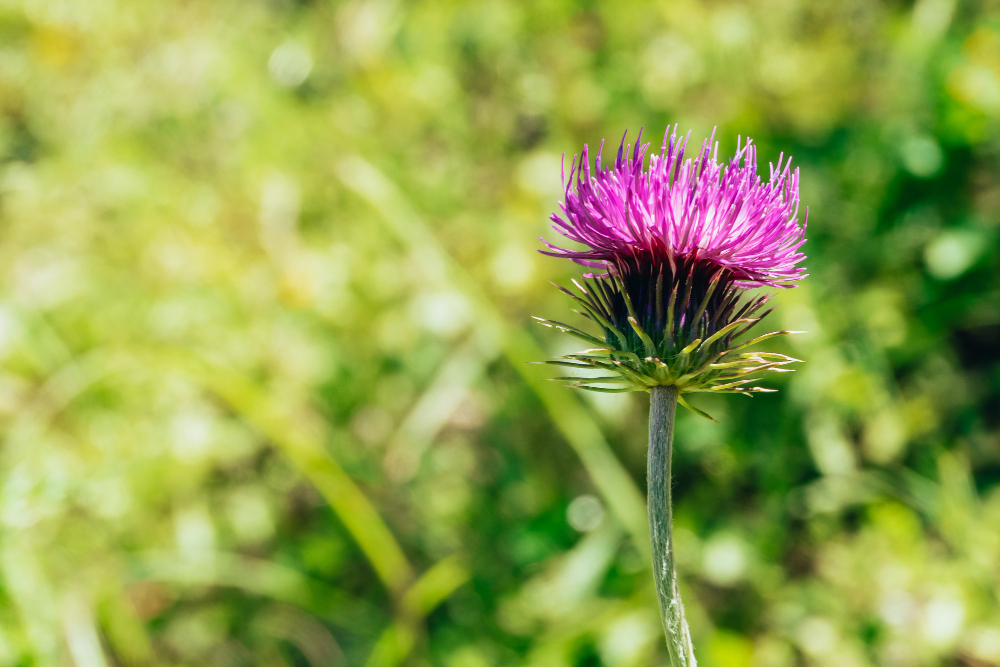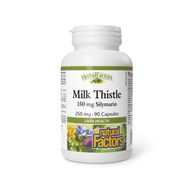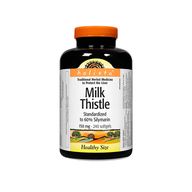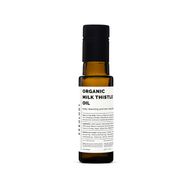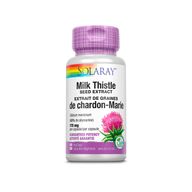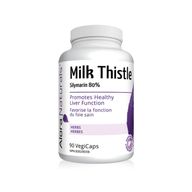Milk Thistle and Liver Detoxification: Understanding Its Mechanisms, Benefits, Dosage, and Side Effects
Milk thistle (Silybum marianum) is a flowering plant native to Europe, Asia and North Africa. It has been used for centuries as a natural remedy, particularly for liver problems. The active ingredient in milk thistle, silymarin, is a powerful antioxidant shown to have anti-inflammatory, and liver-protective properties. In this article, the mechanism, benefits, dosage, and side effects of milk thistle will be discuessed.
Milk Thistle and Liver Detoxification
The liver is responsible for filtering toxins from the body and producing bile, which helps to break down fats in the digestive system. Milk thistle has been shown to protect the liver by promoting the growth of new liver cells and reducing inflammation.
One of the primary ways milk thistle supports liver function is by increasing the production of glutathione, a powerful antioxidant that is critical for detoxification processes in the liver. Glutathione acts as a scavenger for harmful compounds, such as free radicals, heavy metals, and other toxins, and helps to remove them from the body.
Milk thistle also inhibits the production of certain enzymes, such as beta-glucuronidase, that can cause damage to liver cells and impair liver function. Additionally, it helps to reduce inflammation in the liver and enhance bile flow, which aids in the digestion and absorption of fats and fat-soluble vitamins.
A randomized controlled trial published in the Journal of Hepatology found that silymarin improved liver function tests, reduced the incidence of complications of cirrhosis, and increased survival rates in patients with alcoholic cirrhosis.
Benefits of Milk Thistle
Besides liver detoxification and protection, milk thistle may also help with cholesterol level and blood sugar level control, as well as skin health.
1. Cholesterol Reduction
Milk thistle has also been shown to have cholesterol-lowering properties, by inhibiting an enzyme called HMG-CoA reductase, which plays a key role in cholesterol synthesis. Silymarin may also increase the activity of another enzyme called LDL receptor, which helps remove LDL cholesterol (the bad cholesterol) from the bloodstream.
A study published in the journal Complementary Therapies in Medicine found that silymarin was effective in reducing LDL cholesterol levels in patients with non-alcoholic fatty liver disease. The study concluded that silymarin may have potential as a natural remedy for reducing the risk of heart disease in patients with fatty liver disease.
2. Blood Sugar Control
Milk thistle may also have potential in helping to regulate blood sugar levels. The active compound silymarin is thought to improve insulin sensitivity.
A randomized, double-blind, placebo-controlled clinical trial published in the Journal of Diabetes and Metabolic Disorders investigated the effects of milk thistle supplementation on blood sugar control in patients with type 2 diabetes. Participants were randomly assigned to receive either 200 mg of milk thistle extract or placebo twice daily for 12 weeks. At the end of the study, the milk thistle group showed significant improvements in fasting blood glucose levels and HbA1c, a measure of long-term blood sugar control, compared to the placebo group. The study concluded that milk thistle may have a beneficial effect on glycemic control in patients with type 2 diabetes.
3. Skin Health
Milk thistle may also have benefits for skin health. A study published in the Journal of Cosmetic Dermatology in 2021 investigated the effects of a topical milk thistle extract on skin hydration and barrier function in healthy female volunteers. Participants applied the milk thistle extract to their face twice daily for eight weeks. The results showed a significant improvement in skin hydration and barrier function, indicating that milk thistle may be beneficial for maintaining healthy skin.
Another study published in the Journal of Cosmetic Dermatology found that silymarin was effective in reducing the appearance of fine lines and wrinkles in patients with photoaged skin. The study concluded that silymarin may have potential as an anti-aging agent for the skin.
How to Use Milk Thistle
For liver health, a typical dosage of milk thistle extract is 200 to 400 mg per day.
For cholesterol reduction, a typical dosage of milk thistle extract is 600 mg per day.
For blood sugar control, a typical dosage of milk thistle extract is 200 to 400 mg per day.
Side Effects and Precautions
Milk thistle is generally considered safe when consumed in recommended dosages. However, some people may experience mild side effect particularly when taken in high doses or over long periods.
1. Digestive issues: milk thistle may cause digestive issues such as bloating, gas, diarrhea, and stomach upset in some individuals
2. Allergic Reactions: in rare cases, milk thistle may cause allergic reactions, including hives, rash, itching, difficulty breathing, and swelling of the face, lips, tongue, or throat.
3. Hormonal effects: milk thistle may have hormonal effects and may interfere with hormone-related medications such as birth control pills or hormone replacement therapy.
4. Drug interactions: milk thistle may interact with certain medications, including blood thinners, anti-anxiety medications, and chemotherapy drugs.
Additionally, pregnant and breastfeeding women should avoid consuming milk thistle supplements.
References:
1. Flora, Kenneth MD; Hahn, Martin MD; Rosen, Hugo MD; Benner, Kent MD. Milk Thistle (Silybum marianum) for the Therapy of Liver Disease. American Journal of Gastroenterology 93(2):p 139-143, February 1998. doi: 10.1111/j.1572-0241.1998.00139.x
2. Huseini HF, Larijani B, Heshmat R, et al. The efficacy of Silybum marianum (L.) Gaertn. (silymarin) in the treatment of type II diabetes: a randomized, double-blind, placebo-controlled, clinical trial. Phytother Res. 2006;20(7):535-538. doi:10.1002/ptr.1913
3. Federico A, Trappoliere M, Tuccillo C, et al. A new silybin-vitamin E-phospholipid complex improves insulin resistance and liver damage in patients with non-alcoholic fatty liver disease: preliminary observations. Gut. 2006;55(6):901-902. doi:10.1136/gut.2005.084475
4. Singh RP, Agarwal R. Prostate cancer prevention by silibinin. Curr Cancer Drug Targets. 2004;4(1):1-11. doi:10.2174/1568009043481672
5. Ferenci P, Dragosics B, Dittrich H, et al. Randomized controlled trial of silymarin treatment in patients with cirrhosis of the liver. Journal of Hepatology. 1989;9(1):105-113. doi: 10.1016/0168-8278(89)90067-8
